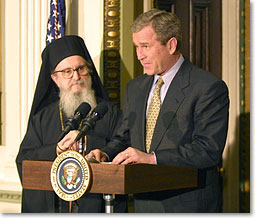
- Afghanistan
- Africa
- Budget Management
- Defense
- Economy
- Education
- Energy
- Environment
- Global Diplomacy
- Health Care
- Homeland Security
- Immigration
- International Trade
- Iraq
- Judicial Nominations
- Middle East
- National Security
- Veterans
|
Home >
News & Policies >
March 2001
|
For Immediate Release
Office of the Press Secretary
March 23, 2001
Remarks by the President with Greek Community Leaders
The Indian Treaty Room
4:10 P.M. EST
THE PRESIDENT: Your Eminence, thank you very much, sir. It's always an honor to be in your presence. I think the last time we were together was at the church service right after I had the honor of being sworn in as the President. And I appreciate so very much you being there.

Deputy Minister of Foreign Affairs Niotis; Ambassador Philon; Ambassador Marcoullis; Director Tenet; distinguished guests from Greece, as well as from America, welcome. It's a beautiful room to hold an important ceremony.
I want to thank you all for coming. I particularly want to thank Congressman Mike Bilirakis, as well as Senator Olympia Snowe, who is not with us today. I know where she is because I flew her up to Maine earlier. (Laughter.) I want to thank you both for organizing the events. And it's interesting to note that I have been in your state and her state within the last week. All is well. (Laughter.)
When I became President I inherited the responsibility to safeguard one of America's oldest and most sacred friendships -- that of the government and people of the United States with the government and people of Greece. We must keep that relationship vibrant, as it has been for 180 years.
It was 180 years ago that Greece proclaimed its independence, yet another example of Greece's contribution to the cause of human liberty. Few nations in the history of the world have done more to contribute to democratic self-government.
A Chinese scholar, hoping to foster an appreciation of Western thought in his country, recently translated the works of Homer into Chinese. He mastered ancient Greek in order to produce the most accurate translation possible, and explained it this way: If one wants to understand Western civilization, one has to search back to its roots. And the roots lead to ancient Greece.
Greek ideals had an enormous influence on the American founders. James Madison, the father of the Constitution, wrote this: Among the confederacies of antiquity, the most considerable was that of the Grecian republics.
We respect the ancient influence of Greece, and we value its modern friendships. Greece and America have been allies in the great 20th century struggles against Nazism, Soviet Communism, and Iraqi aggression. Our two nations are bound by history, by trade, by mutual respect, by common ideals, and one of the world's most important alliances.
We in the United States consider Greece to be a friend, a strong ally, and a powerful force for good in the world. And all the world will see this in vivid display when Athens hosts the Olympics of 2004. We're all looking forward to the great event.
I'm very pleased with the strong and expanding relationship between the United States and Greece. Our trade has increased by 16 percent in the last year. Tourism and high-level contacts between the United States and Greece have also increased.
I want you to know that the United States stands ready to help Greece and Turkey as they work to improve their relations. I'm also committed to a just and lasting settlement of the Cyprus dispute. My administration fully supports the U.N. Secretary General's efforts to bring peace and prosperity to all Cypriots. Our goal is an early resumption of the U.N. process.
The greatest gifts of Greece, however, to this country are the emigrants it's sent, men and women who enrich our nation with their spirit. They're the models of community and enterprise, of family, of education and public service. And we honor Greek independence. And as we honor Greek independence, I also want to honor the Greek contribution to our national character.
So it's my pleasure to welcome you, Your Eminence, our distinguished guests, to this celebration of Greek Independence Day. God bless. (Applause.)
END 4:20 P.M. EST


